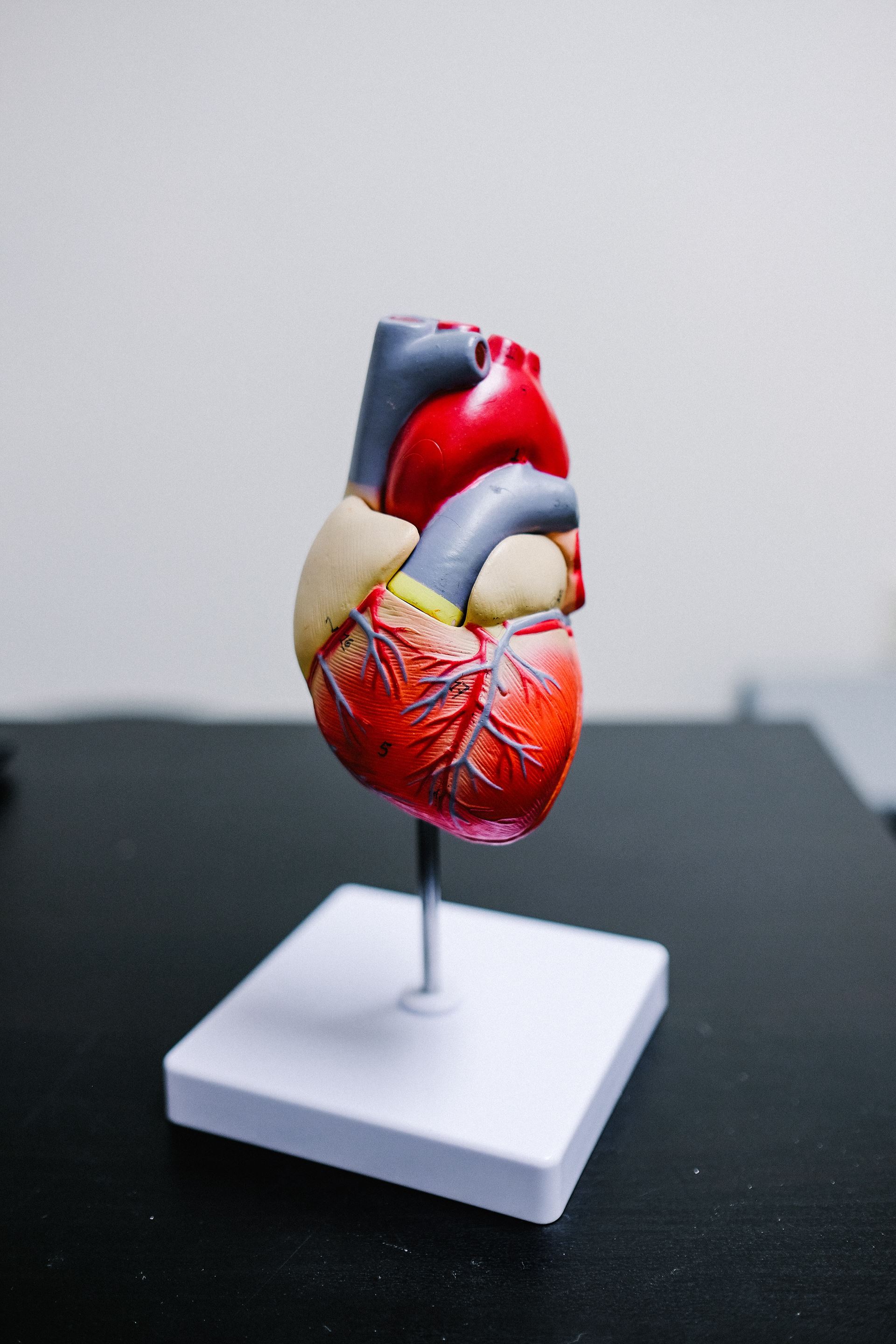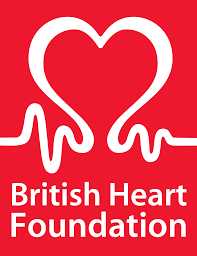Heart Health
What is Heart Disease?
This name describes a number of conditions affecting the heart, the muscular pump that moves blood around the body. These conditions range from:
- Disease of the blood vessles called Coronary Artery Disease (the most common)
- Heart valve disease, including aortic stenosis
- Irregular heart beats called arrhythmias, including atrial fibrillation
- Disease of the muscular walls of the heart
- Heart conditions that babies are born with called Congenital Heart Disease
Heart disease is very common. There are around 7.6 million people living with heart disease in the UK. This can be quite severe; Coronary Artery Disease is the most common cause of heart attacks and was the biggest killer of men and women around the world in 2019.
However, there are steps we can take to reduce our risk of Heart Disease and to improve the lives of those living with Heart Disease. This page contains useful information on these steps.

Heart Health at Bangholm
The wonderful team here at the surgery can help with any of your concerns about Heart Disease.
GPs work alongside patients to manage heart conditions and advise on the best way to improve heart health. Hannah, our pharmacist runs weekly hypertension clinics aimed at controlling high blood pressure. Our physician associate, Peju can also help with lifestyle and medication advice, as can our lovely nursing team.
If you'd like to discuss your risk of heart disease or lifestyle & medication advice, you can arrange an appointment by giving us a call or speaking to your GP.
If you're interested in learning more about maximising heart health please follow the useful links at the bottom of this page.

What is Heart Disease?
Risk factors (RF) are conditions or lifestyle habits that increase our risk of developing a disease. Some of these are factors we have control over and some we don't.
Factors we can control, treat or change:
- Physical Inactivity
- Smoking
- High Cholesterol
- High blood pressure
- Diabetes
- Obesity
- High Alcohol intake

Physical Activity Advice
It is important that we do some type of physical activity every day. If you have not exercised for some time it is best to talk to your GP before significantly changing your activity level.
NHS advice for those aged 19 to 64:
- Strengthening activities working the major muscle groups on at least 2 days a week
- At least 150 mins of moderate intensity activity or 75 mins of vigorous intensity activity a week
- It is best to spread this activity evenly over 4 or 5 days a week or do some every day
Adults aged 65 and older:
- Aim to be active everyday even if just light activity
- do strength, balance and flexibility training at lest twice a week
- If already active try to do 150mins moderate activity and 75 mins vigorous activity a week
For more detailed advice and examples of moderate or virgorous activity visit:
Fit for Health at Edinburgh Leisure
Fit for Health is a 16 week referral programme delivered by Edinburgh Leisure in partnership with Edinburgh Health and Social Care. It is a physical activity programme designed for people aged 16 and up with a long term health condition (e.g. cardiovascular disease, respiratory disease, heart failure, cancer, arthritis, diabetes or those at risk of diabetes).
If you are keen to participate, please complete the form in the link below. The Active Communities scheme helps over 10,000 people a year to get active and improve their health and could be a great way for you to improve your physical health in a safe and structured way.

What does it involve?
- Weekly classes lasing 1 hour at no extra cost for the 16 weeks
- A Fit for Health card also entitles you to discounted access to other facilities like swimming, fitness classes and gym access
- Includes studio based group activities, gym based sessions and pre-recorded sessions

Fit for Health Referral
What is BMI and why is it important?
Body Mass Index (BMI) is used to measure if your weight is healthy for your height. This is important as being overweight, obese or underweight can have signifcant effects on your long term health. Being overweight or obese can increase your risk of developing heart disease, diabetes and some types of cancer.
BMI Categories
- Underweight: < 18.5
- Healthy: 18.5-25
- Overweight: 25-30
- Obese: anything over 30
Please use the adjacent calculator to find out your BMI. If your BMI is overweight or obese, you can discuss this result at an annual review appointment, with your GP or use some of the resources on this page to help make lifestyle changes.
Dietary Advice
The recommended diet for heart health is a low-fat, high-fibre diet including lots of fresh fruit and vegetables (at least 5 a day) and whole grains.
FAT, it's not all bad! The two main types of fat are saturated and unsaturated fats. For a healthy heart it is best to avoid saturated fat as this increases the levels of bad cholesterol in your blood.
- Avoid or limit foods like: meat pies, sausages and fatty cuts of meat, butter, cream, hard cheese, cakes and biscuits, palm and coconut oil
- Opt for: oily fish, avocados, nuts and seeds; sunflower, rapeseed, olive and vegetable oils
Statins
Sometimes, if diet and exercise can't keep bad cholesterol levels low enough, your GP may recommend you take a medicine called a statin.
These are a group of tablets that help to lower the level of bad cholesterol in the blood. This is important as high cholesterol can cause narrowing and hardening of the vessles supplying the heart causing Coronary Artery Disease.
You can usually tell if one of your medicines is a statin as the name ends in -statin. Examples include atorvastatin, simvastatin, rosuvastatin. Statins are tablets taken once a day usually in the evening. They can sometimes interact with grapefruit juice and other medicines so its important to read the information leaflet or contact your GP or pharmacist for advice.
If you have been diagnosed with Heart Disease you will usually be offered a statin to reduce the risk of any further episodes. If your risk of Heart Disease is high, you may be offered a statin even if you do not have Heart Disease currently. Your GP will recommend a statin if you have a strong family history or if you have a 1 in 10 chance of developing Heart Disease in the next 10 years.
Annual Heart Health Review at the Practice
We would like people with certain heart conditions to have an annual birthday review. This includes people with hypertension, coronary heart disease, atrial fibrillation, heart failure and peripheral vascular disease. You will usually be sent a letter reminder for this.
What will we check?
- Blood test. Usually checking for blood count, kidney & liver function and cholesterol levels. If you take blood thinners for atrial fibrillation, we may also need to check how well your medicines are thinning the blood.
- Blood pressure check. Ideally we will check your home readings as these can be more accurate.
- Urine test. We may need to perform a urine dip test. This checks for several things for example - kidney health especially if you have high blood pressure.
- Update on weight, smoking and alcohol intake.
- Medication review. A memeber of the clinical team will review your current medications to ensure you are on the optimal regime for your heart condition and to maximise your heart health. This could include medication for high blood pressure, statins for high cholesterol and any other medicine you are taking. You will be informed if we need to make any changes to your medicines.
You can submit your blood pressure readings and updates about weight, smoking and alcohol intake online using the form at the bottom of this page. If you do not have a BP monitor at home they can be purchased online or in most chemists for a reasonable price. Alternatively you can borrow one from the practice by enquiring at reception.
Useful Links & Contacts
Useful NHS Links:
Fit for Health Contact Details:
- Website: Fit for Health at Edinburgh Leisure
- Contact the Active Communities team on 0131 458 2260 or email active@edinburghleisure.co.uk
Heart Failure
Ischaemic Heart Disease (IHD)
Atrial Fibrillation
Page created: 04 September 2020










